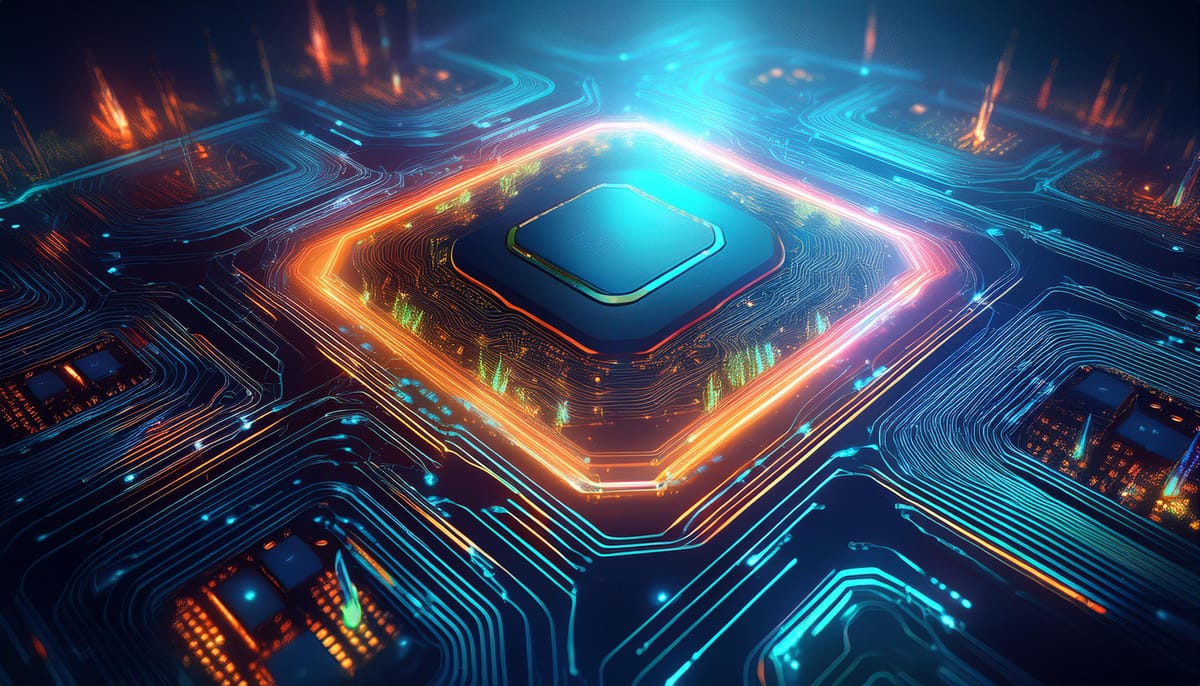In the fast-paced realm of artificial intelligence, every technological advancement is eagerly anticipated. So when news broke about NVIDIA's highly anticipated Blackwell AI chips facing a delay, it sent ripples through the tech industry. This setback isn't just a minor hiccup; it's a significant event that could reshape the landscape of AI hardware and impact some of the biggest names in tech.
NVIDIA's Blackwell AI chips, poised to be the next big leap in GPU technology, have hit a snag in their development process. According to reports from The Information, these cutting-edge processors are facing a delay of at least three months. This postponement has far-reaching consequences for the AI industry and could accelerate innovation in unexpected ways.
Understanding the Blackwell Delay: What Went Wrong?
The root of the problem lies in design flaws discovered late in the manufacturing process. These issues touch upon several critical aspects of the chip's performance:
| Issue | Description |
|---|---|
| Power Delivery | Problems with efficiently distributing power across the chip |
| Overheating | Challenges in managing the heat generated by the powerful processors |
| Packaging Technology | Complexities with TSMC's CoWoS-L packaging technology |
These technical hurdles have forced NVIDIA to reassess its production timeline. The company is now conducting new test runs with TSMC, its manufacturing partner, to address these issues. This process is crucial but time-consuming, leading to the significant delay we're seeing.
NVIDIA had set ambitious production targets for its Blackwell chips, aiming to manufacture over a million units per quarter. However, the current setback has thrown a wrench into these plans:
- Initial deliveries of the B100 and B200 AI Superchips are pushed back by at least three months.
- Production targets for Q3/Q4 2024 and the first half of 2025 are affected.
- Large shipments of Blackwell chips are now not expected until the first quarter of 2025.
This delay is more than just a temporary setback; it's a significant disruption to NVIDIA's roadmap and the plans of numerous tech giants relying on these advanced GPUs.

Learn more about how GPU advancements drive AI innovation
The Ripple Effect: Major Tech Companies in the Crosshairs
The delay of NVIDIA's Blackwell chips doesn't just affect the GPU manufacturer; it sends shockwaves through the entire tech industry. Some of the biggest names in technology have placed substantial orders for these next-generation processors, and now they're facing the prospect of adjusting their plans and timelines.
| Company | Potential Impact |
|---|---|
| Microsoft | Delays in AI infrastructure upgrades and service improvements |
| Setbacks in AI research and cloud service enhancements | |
| Meta | Adjustments to AI model training schedules and product development |
| OpenAI | Constraints on large-scale AI model development and deployment |
| Amazon Web Services | Delays in offering next-generation AI instances to cloud customers |
| Tesla and xAI | Possible impact on AI-driven automotive features and research projects |
Microsoft, as one of NVIDIA's largest customers, may need to revise its AI infrastructure plans significantly. This setback could affect various Microsoft products and services, from improvements to its Azure AI offerings to enhancements in tools like GitHub Copilot and Bing Chat.
Google's progress in areas like natural language processing, computer vision, and machine learning might slow down. It could also affect the company's ability to offer cutting-edge AI capabilities to its Google Cloud customers, potentially giving competitors a temporary advantage.
Meta Platforms may need to adjust its timelines for training and deploying large-scale AI models. This could impact the company's ability to introduce new AI-driven features across its social media platforms and potentially affect its ambitious plans for the metaverse.
OpenAI, known for its cutting-edge AI models like GPT-4, might face constraints in developing and deploying even more advanced versions of its language models. The company's research progress and the rollout of new AI capabilities could be slowed down.
Amazon Web Services (AWS) will likely postpone the introduction of Blackwell-based high-performance AI computing options. This setback could temporarily limit AWS's ability to provide the most advanced AI infrastructure to its clients, potentially affecting its competitive position in the cloud AI market.
For Tesla and xAI, Elon Musk's companies focused on autonomous driving and AI research, the delay might mean a slower rollout of advanced AI features in vehicles or a need to optimize existing hardware to continue pushing the boundaries of AI technology.

Discover how this chip delay might affect NVidia Estimates
Broader Implications for the AI Industry
The delay of NVIDIA's Blackwell chips extends beyond individual companies, affecting the broader AI industry in several ways:
- Potential Slowdown in AI Research: The postponement could lead to a temporary deceleration in AI research and development across the industry. However, it might also spur innovation in software optimization and alternative AI acceleration techniques.
- Market Competition: This delay opens a window of opportunity for NVIDIA's competitors in the AI chip market. Companies like AMD, Intel, and various startups may capitalize on this situation to showcase their own AI accelerator technologies and potentially gain market share.
- Cloud Service Adaptations: Cloud service providers like AWS, Google Cloud, and Microsoft Azure will likely need to revise their infrastructure upgrade schedules. This could impact the rollout of new AI-focused cloud services and potentially affect the performance and efficiency of existing ones.
- Impact on AI Startups: Smaller companies and startups that were anticipating access to Blackwell's advanced capabilities may face challenges in pushing the boundaries of AI innovation. This could drive these companies to find creative solutions, optimize their AI models for existing hardware, or explore alternative acceleration methods.
- Energy Efficiency Focus: As AI models grow larger and more complex, there's an increasing emphasis on developing more energy-efficient AI hardware to address environmental concerns and operational costs.
NVIDIA's Response and Future Plans
Despite the setbacks, NVIDIA remains committed to delivering breakthrough AI capabilities with the Blackwell platform. The company is adapting its strategies to address the technical challenges while maintaining its leadership in the AI hardware market.
NVIDIA has adjusted its timeline, with large shipments of Blackwell chips now expected in Q1 2025. The Blackwell platform will include the GB200 GPU and other variants, designed to cater to a wide range of AI and high-performance computing needs.
To complement its hardware offerings, NVIDIA is investing heavily in software development. The NVIDIA AI Enterprise suite and NIM inference microservices are being prepared to fully leverage the capabilities of the Blackwell architecture. These software solutions aim to reduce LLM inference operating costs and energy consumption by up to 25x compared to their predecessors.
NVIDIA is also strengthening its partnerships across the AI ecosystem, collaborating with major cloud providers and server manufacturers to ensure a robust infrastructure for Blackwell's eventual release.
Looking Beyond Blackwell: The Future of AI Hardware
While the Blackwell delay is a significant event in the AI hardware landscape, it's essential to consider the broader context and future of GPU technology for AI:
- Increasing Demand for AI Compute: The appetite for AI computing power continues to grow exponentially, driven by advancements in large language models, computer vision, and other AI applications.
- Alternative Architectures: The delay might accelerate the development and adoption of alternative AI acceleration architectures, including ASICs, FPGAs, and specialized AI chips.
- Quantum Computing on the Horizon: While still in its early stages, quantum computing looms on the horizon as a potential game-changer for certain AI applications, potentially complementing traditional GPU-based AI acceleration.
- Edge AI and Specialized Hardware: The growth of edge computing and IoT applications is driving the development of specialized AI hardware optimized for low-power, edge deployments.
The delay of NVIDIA's Blackwell chips serves as a reminder that even in the rapidly advancing field of AI, progress isn't always linear. While this setback presents challenges for NVIDIA and its customers, it also opens up opportunities for innovation, competition, and a reevaluation of AI hardware strategies across the industry.
As we navigate this temporary hurdle, one thing remains clear: the demand for advanced AI capabilities continues to grow. Whether through NVIDIA's eventual release of Blackwell, advancements from competitors, or innovative software optimizations, the AI industry will undoubtedly find ways to push forward.
The coming months will be crucial as NVIDIA works to resolve the technical challenges and as other players in the industry adapt to this new timeline. For those of us watching from the sidelines, it's an exciting time to witness the resilience and creativity of the tech industry in action.





